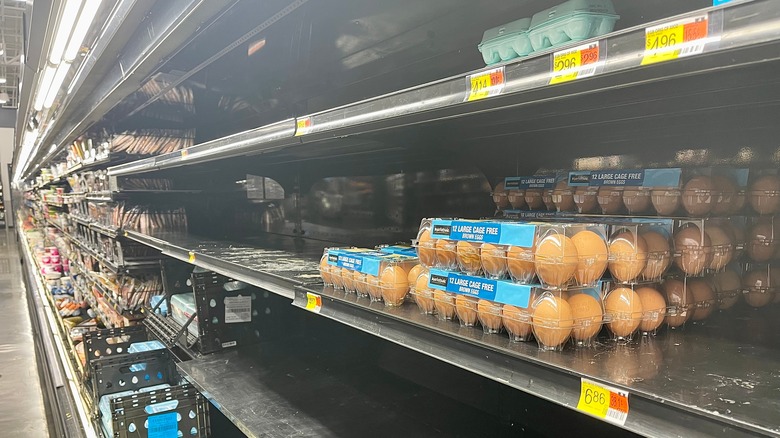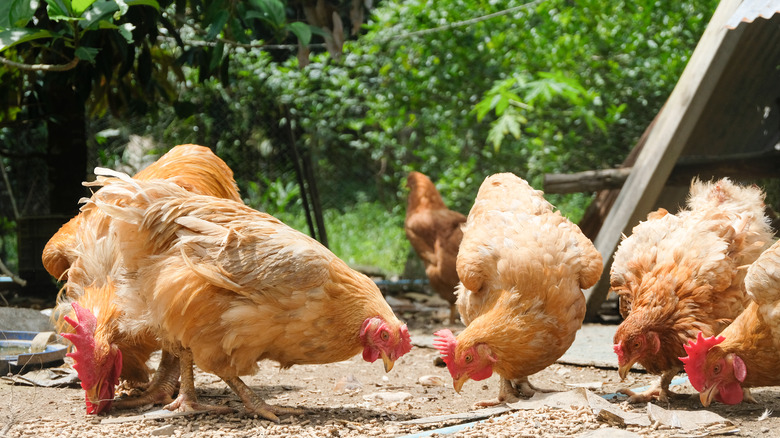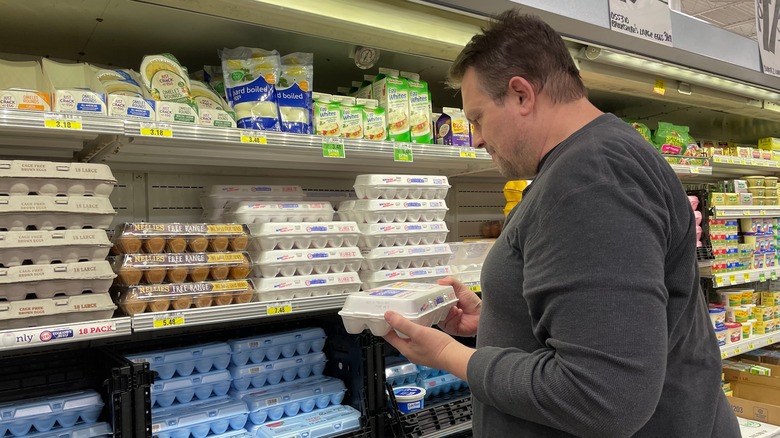California Is Getting Hit By The Worst Of The Egg Shortage. Here's Why
Egg prices in California have more than doubled over the past six months, reports ABC7. In some states, people are buying their own chickens to help alleviate the costs. However, things are a lot worse in the Golden State, where the bird flu and other factors have led to an egg shortage.
Highly pathogenic Avian influenza (HPAI), or bird flu, is caused by a subtype of the influenza A virus. This highly contagious disease affected more than 58.3 million birds in the U.S. over the past few months, per the U.S. Department of Agriculture. In California, the virus has decimated close to 53,000 birds over the last 30 days. "We had to cull close to 60 million laying hens, and the problem with bird flu is that if one hen gets it, you have to cull the entire flock," said journalist and published author, Phil Lempert (via ABC7).
But the Avian flu outbreak is just one piece of the egg puzzle. California's egg shortage has several underlying causes, and some may not be obvious to the average consumer.
The state's ban on eggs from caged hens may be to blame
Los Angeles Times reports that a growing number of Californians are heading to Mexico to buy eggs because of the recent price spikes. The average cost of a dozen large eggs increased from $2.35 to $7.37 in one year, hitting consumers' pockets. And as if that wasn't bad enough, most stores are struggling to keep up with the demand for this staple food item.
A contributing factor to the current egg shortage is Proposition 12, a bill passed in 2018. According to the California Department of Food and Agriculture, the bill requires farmers to assign a specific number of square feet to egg-laying hens, veal calves, and pigs. Moreover, farmers may not sell produce from these animals unless they meet the space requirements. "It takes a lot of money to convert to cage-free — millions and millions of dollars — and it cannot be done overnight," explained John Lewis Jr., a farm operator, in an interview with Valley Voice.
As of today, only one-third of the supply of eggs in the U.S. comes from cage-free hens, per Los Angeles Times. This aspect, along with the rising inflation and the bird flu outbreak, is driving up egg prices while causing a shortage of eggs in the market. In the meantime, you can use ground flaxseed, arrowroot powder, aquafaba, and other egg substitutes in baked goods until things return to normal.
Supply disruptions have caused a jump in egg prices
Egg prices have increased all over the country, not just in California. This nationwide trend is due to rising consumer demand coupled with a diminishing supply of this grocery staple. According to NBC15, it all started last year in the spring when the labor shortages caused by the pandemic were on the rise. At the same time, poultry farmers were fighting the bird flu outbreak, losing millions of birds.
"Eggs are just like any other product in the grocery store. We've seen increased transportation prices due to increased fuel costs, packaging [costs] have increased, and labor is more expensive," said Jim Chakeres, the Ohio Poultry Association's executive vice president, in a recent interview with The Enquirer. He also warns that spring migration will likely make things worse, given that wild birds may carry the Avian flu and spread it to hens.
Some say that egg prices could finally start to drop this year, but right now it's too early to make solid predictions. It all depends on how farmers will deal with the bird flu outbreak and where inflation is headed. On the positive side, the holiday season is over, which may help reduce the growing demand for eggs and balance the supply chain.


